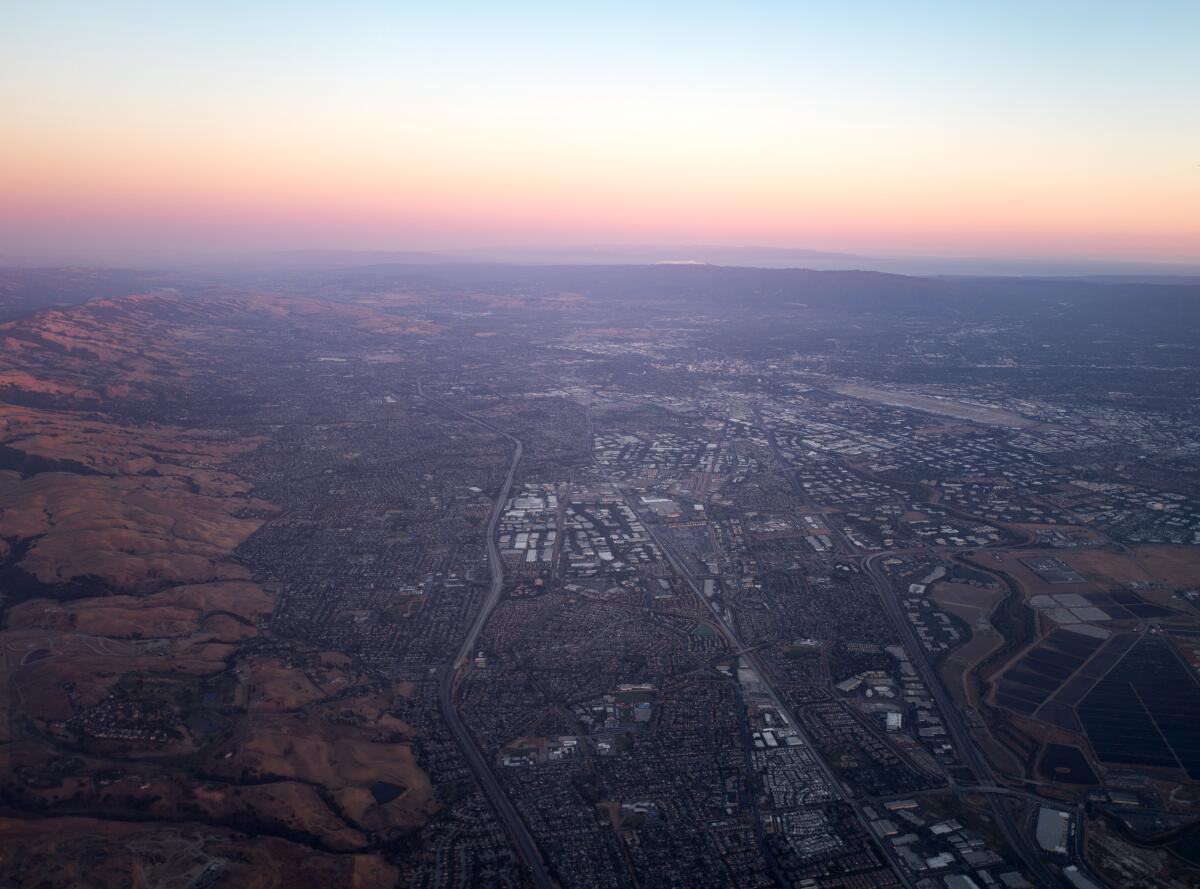Op-Ed: Big Tech is hurting big ideas in Silicon Valley

Last month, in the Santa Cruz Mountains, south of San Francisco, I climbed alone up to a treehouse nestled in a ring of redwoods. Released from a rigid work schedule, I could dream my way into the novel I’m writing. I tapped into my body, feelings, ancient memories. Amid birdcalls and rabbit snuffles, what rose to the fore were lateral associations: My book is set in a dystopian future, but I unexpectedly dreamed into the plot a parallel to the FBI’s targeting of Hollywood and student radicals in the ’60s. I was unnerved, hearing my own thoughts.
My intuition had been, miraculously, it seemed, uncorked by leaving my cutthroat life in Silicon Valley for a few days. I could free-associate and let my mind play in a way I struggle to do, as a ghostwriter and editor who works seven days a week to stay afloat. I had leisurely conversations with an older mountain woman and talked to the wandering, wailing peacock she’d named Loverboy. A charming 20-something at a vineyard described grapes with a sensuous vocabulary. A waitress gave me sea-watching tips. Their lives were going at a pace different from mine.
During this sojourn, I was engaged in associative thinking, which involves near automatic connections between disparate sensations, memories and ideas. This is the way daydreaming works; the way children and artists think. I remember it from my school days in 1980s Palo Alto, when the elemental chaos of Silicon Valley was starting to turn the area into an innovation hub. But by high school — before the first dot-com bubble — the emphasis started to shift to more linear, convergent thinking. With convergent thinking — the sort of thought process that’s measured on a standardized test — there’s only one right answer.
I’m a Latina leader in tech. Why is that so rare?
Over nearly four decades here, I have watched the spontaneity that made that tech boom possible tamp down, as big ideas have morphed into big companies. The inventiveness that was a beacon to misfits and eccentrics has been replaced with conformity that furthers the airless logic of corporations rather than the creativity of people.
In my childhood, divergent and interdisciplinary thinking seemed entirely normal to me, growing up in the confluence of immigrants, working-class people, progressive hippies, engineers and artsy folk. No idea seemed off-limits.
The realization that my home was changing started as the boom snuffed beloved places of my childhood. Printer’s Inc., the literary bookstore in Palo Alto where I first heard Margaret Atwood read, initially closed in 1998 during the bubble, and then shuttered permanently in 2001 as the boom went bust. The building’s train mural lived on, but the book community dispersed. Yet tech regrouped and grew bigger than ever. It seems to me that as people came to the Bay Area not because they were nerds following their bliss, but because they saw dollar signs, convergent thinking increased. I was absorbed by this ethos, forgetting how to rest my mind, to let it wander, until I was in the mountains this summer daydreaming.
Don’t get me wrong. The poetry of that other Bay Area hasn’t disappeared. I still catch old highs. Art installations. An unexpected conversation about writer Anne Carson with an investor. Chats with longtime friends and artists who live here to be close to their families. But it’s a shadow world, a place visible only to those searching for it. Increasingly, the media depiction of where I live is yet another siren song, luring those in search of the traditional American Dream.
The San Jose, Sunnyvale and Santa Clara region where I live has one of the highest concentrations of science and technology workers in the country. Excessive work is treated as a badge of passion. One friend here, who clocks in 80-hour weeks, was frustrated he couldn’t work more when his European company insisted on time off and simply shut down. There are limited opportunities for long conversations with people in other fields — teachers, firefighters, ethicists, painters. It’s those disorderly exchanges that illuminate unusual connections in our thinking, rather than obvious patterns.
Even at birthday parties, parents chit-chat about ideas for mobile apps. While I’m inclined to satirize this, I also sense a sadness. It’s expensive to live here. If you haven’t struck gold, you pursue money-making ventures. The first thing to be axed is the chaos of dreamtime.
The assemblyman who heads the Legislature’s tech caucus remains under investigation by California’s political ethics watchdog.
In some cases, convergent thinking has its advantages. I feel lucky that neighbors are vaccinated and believe in reason and science. But I also encounter a lot of thinking that mirrors the narrow algorithms that Netflix and Amazon use to predict consumer preferences, the rote strategies that students learn to game standardized exams, not the bold, interdisciplinary thinking that built the place.
As author Eric Weiner has argued, the conditions under which genius can be recognized involve “a mix of diversity, discernment, and disorder.” While multicultural diversity continues apace in Silicon Valley, from what I can tell, discernment and disorder here are disappearing, something I needed to go up a tree to realize I missed. Intellectually different people — who might imagine their way out of the imperatives of corporations by arriving at insights robots can’t reach — deserve to not only afford to live here, but rest their minds too.
Tech companies might give us convenience, but they can’t provide us with shaggy truths or expose strange dissonances. That’s the province, still, of imaginative artists and writers — but only if they’re given the time to wander from one messy, illogical dream to another.
Anita Felicelli is a novelist and serves as fiction chair on the National Book Critics Circle board. @AnitaFelicelli
More to Read
A cure for the common opinion
Get thought-provoking perspectives with our weekly newsletter.
You may occasionally receive promotional content from the Los Angeles Times.












